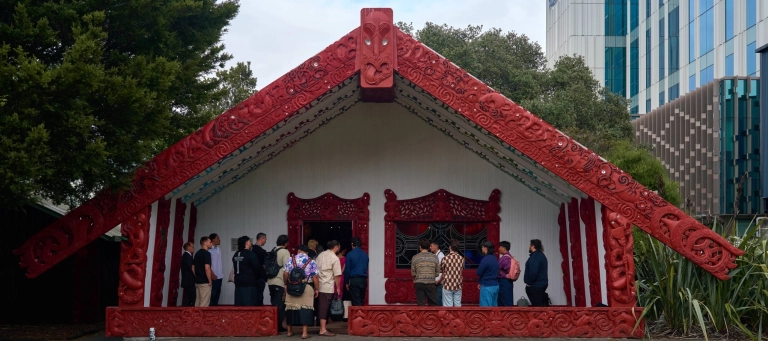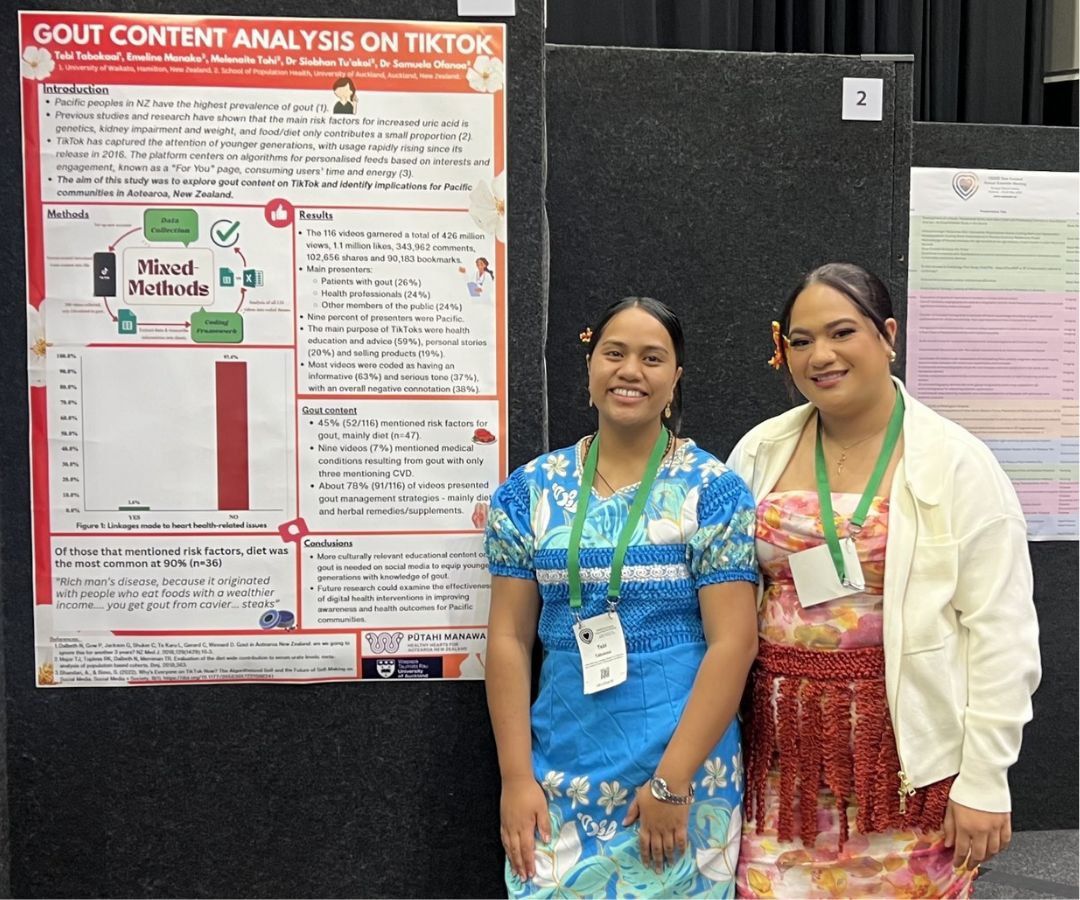Summer Research Programmes - Kura Raumati and Fatu Malosi
Kura Raumati and Fatu Malosi are two distinct summer research programmes that provide the opportunity for tauira (students) studying at a tertiary level to get a taste of research by participating in a kaupapa Māori or Pacific-designed and led heart health research programme over summer.

Overview
Kura Raumati and Fatu Malosi begin with a noho marae wānanga or fonotaga where students and supervisors come together to explore kaupapa Māori and Pasifika heart health approaches, respectively.
Students then spend time undertaking their research projects with their supervisors and support from Pūtahi Manawa staff, as needed.
The programmes conclude with the presentation of students’ findings, experiences, and insights. The final presentation is an opportunity for students to invite key stakeholders to the dissemination of their findings. This is also a time to celebrate the hard work and reconnect with new colleagues and friends.
Where can a summer with Pūtahi Manawa take me?
Graduates of Kura Raumati and Fatu Malosi have gone on to:
- Present their project at conferences nationally and internationally.
- Make long-lasting relationships.
- Continue working on their project topic as a research assistant.
- Build on their project through postgraduate study.
- Do a PhD!
- Make their CV look better when applying for future opportunities (like funding or job roles).
- Become a Pūtahi Manawa member and all the benefits that go with that.
- Join Te Whare Tukutuku, a network of Māori and Pacific heart health professionals.
- Join large-scale community outreach events with Pūtahi Manawa, such as Polyfest and Waitangi Day.

Who is Kura Raumati and Fatu Malosi for?
Any tertiary-level Māori and Pacific students who have an interest in developing skills, knowledge and networks, and who are interested in contributing to the advancement of heart health equity for Māori and Pacific peoples in Aotearoa New Zealand.
Eligibility Criteria
Students must:
- Be enrolled in tertiary-level study (Certificate/Foundation, Diploma, Bachelor, pre-Doctoral levels)
- Whakapapa Māori
- Be interested in growing research skills and knowledge
- Be willing to contribute to improving the heart health of our Māori whānau and communities
- Not be undertaking Summer School during the tenure of the programme
- If undertaking employment or volunteering, work no more than 10 hours per week and be available to fully participate in the programme
Expectations
- Successful applicants are committed to the duration of the programme and will treat this as a full-time job (40 hours per week)
- Be able to attend the wānanga or fonotaga
- Attend and present your research at the presentation and celebration in the final week of the programme.
We will provide:
- A taxable stipend of $9,000 or a tax-free stipend of $8,000
- Support throughout the duration of the programme, including weekly check-ins
- Travel assistance if the wānanga/fonotaga, student presentations, or celebration venues are located outside the city where you have been based during the programme. Final decisions regarding travel assistance will be at the discretion of the Kura Raumati and Fatu Malosi leads.
How to apply
- Become a Pūtahi Manawa member
- Go to Funding Opportunities in the online Member Portal
- Click on the relevant application form.
- If you are of Māori and Pacific descent, you may apply for both Fatu Malosi and Kura Raumati. You only need to fill in one application form.
Previous years’ projects have included:
• Co-designing heart health initiatives
• Developing and analysing community surveys
• Exploring pūrākau and storytelling in health
• Evaluating the use of rongoā Māori in clinical settings
Whakapapa of the Pūtahi Manawa summer research programmes
- 2021 Pūtahi Manawa Healthy Hearts for Aotearoa New Zealand Centre of Research Excellence was founded.
- 2022 Te Ara Poutama Integrated Research Module led by Erina Korohina, hosted by The Centre for Health and co-funded by Pūtahi Manawa and the Heart Foundation was established.
- 2023 Pūtahi Manawa initiated a summer research programme, offering a total of six places to three heart research centres: Manaaki Manawa at the University of Auckland, Heart Otago and the Christchurch Heart Institute at the University of Otago, stipulating that at least one awarded student from each research centre must be either Māori or Pacific.
- 2023 Te Ara Poutama initiated a Māori summer research programme, Kura Raumati, and funded ten Māori students through the Integrated Research Module.
- Pūtahi Manawa and Pūhoro STEMM partnership saw Pūtahi Manawa provide seven Pūhoro STEMM students funding and support for a summer research project. These students became part of the Te Ara Poutama Kura Raumati inaugural cohort.
- Summer 2023/24 Twenty-one Māori students experienced the inaugural Māori Summer Research Programme with Pūtahi Manawa, put together by Erina Korohina, and Pūtahi Manawa Outreach and Education Lead, Dr Anuj Bhargava. One Pacific student and two other students also graduated from this inaugural Pūtahi Manawa summer cohort.
- 2024 Inaugural Pūtahi Manawa Pacific Summer Research Programme, Fatu Malosi is initiated. Spearheaded by Pūtahi Manawa Co-Director Pacific, Ms Soteria Ieremia, and supported by the Pacific Leadership Team, Fatu Malosi was led by Dr Julie Winter-Smith and Nuseta Hope. The programme ran alongside the second cohort of Kura Raumati.
Summer 2024/25 A total of forty-one students, fifteen Pacific and twenty-six Māori, participated in Fatu Malosi and Kura Raumati, respectively, with seven students returning from the previous summer.
- 2025 The kaitiakitanga of Kura Raumati was placed with Pūtahi Manawa.
- Summer 2025/26 Kura Raumati and Fatu Malosi run side by side with a new cohort of students.

